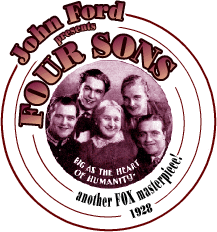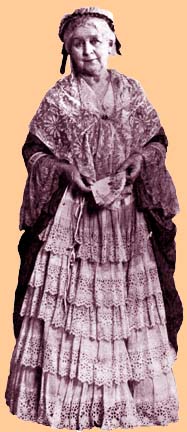

Back of the making of Fox's latest sensation, "Four Sons," is the biggest human interest story of the year. It concerns a lady, no longer young enough to have hoped for anything in particular, much less fame -- and a great, big, rugged sort of Irishman named Jack Ford, who has made about every other good picture that William Fox has ever produced. Though no popular novelist would recognize them as such, these two are the hero and heroine of this story. That's where it is different. Margaret Mann is a character woman; she looks like anybody's mother, and Jack Ford looks like an Irishman. They aren't the types. But, anyway, here is the story:
 For nine years John Ford has been producing movies
for the Fox Company. That speaks pretty well for both the company
and Mr. Ford. He made a great many of Tom Mix's pictures and
also "The Iron Horse," "Three Bad Men," and
"Mother Machree." Everybody on the lot liked him --
and not only because his pictures brought in shekels to the box-office.
The "grips" could tell you that he was a heck of a good
fellow who directed without temperament, sat in on a bridge or
poker game whenever the opportunity presented itself, and while
the name of his beautiful wife, Mary, was never off the social
sheets, his home was "open house" to everybody in his
company from the star to the prop boy. His idea of a big evening
was not the Cocoanut Grove. If somebody couldn't get up a bridge
game, he'd rather sit home reading over new short stories and
novels that might develop into good movies.
For nine years John Ford has been producing movies
for the Fox Company. That speaks pretty well for both the company
and Mr. Ford. He made a great many of Tom Mix's pictures and
also "The Iron Horse," "Three Bad Men," and
"Mother Machree." Everybody on the lot liked him --
and not only because his pictures brought in shekels to the box-office.
The "grips" could tell you that he was a heck of a good
fellow who directed without temperament, sat in on a bridge or
poker game whenever the opportunity presented itself, and while
the name of his beautiful wife, Mary, was never off the social
sheets, his home was "open house" to everybody in his
company from the star to the prop boy. His idea of a big evening
was not the Cocoanut Grove. If somebody couldn't get up a bridge
game, he'd rather sit home reading over new short stories and
novels that might develop into good movies.
One evening he read a story in The Saturday Evening Post by I.A.R. Wylie called "Grandma Bernle Learns Her letters." He read it a second time, and the next morning he took it down to the studio along with his pipe. "I think this is a wow," he told the boss who put up the money for such things. For the first time on record a director and his producers agreed on a story. They, too, through it was a wow. They got hot on the Western Union wires and purchased it before anyone else got the chance.
All the time he was in Europe on his vacation, the Irish Mr. Ford thought of nothing but the German "Grandma Bernle" which he was to produce immediately after his return. The simple little story of the old German lady who has four sons in the war kept turning over and over in his mind. A great part of the story was laid in Germany, so he spent most of his vacation in the exact locale. He hired the ex-Kaiser's former official cameraman and took atmospheric shots of the country that could be inserted into the picture. The minute he got back to Hollywood, he taxied out to the studio from the train to talk about the casting of the picture. That presented a problem.
The story is very simple in plot development. There aren't any big fires or breaking dams or other spectacular climaxes. About all that happens in the theme is that this little old German lady who had three German sons in the army and one German son in the United States finally ventures across the great ocean to live with the boy who fought against his brothers in the war. Because the characterization rather than the climax was the great part of the story, the Front Office felt an actress with a big name should get the role. They suggested Mary Carr and Louise Dresser and Belle Bennett and all the other splendid character women who have made mothers what they are on the screen. But the young director had another idea.
"There's a woman named Margaret Mann who has been playing bits and extra work in my picture for years," he told them. "She's a great actress if I ever saw one. She's never done anything big but ever since I read this story, I've had her in mind. Why couldn't we use her?"
The Front Office was leery. Here was one of the big specials of the year, the logical follower-up to such hits as "Seventh Heaven" and "Sunrise." They didn't think it wise to use an unknown woman. So they advised Jack to get a Name.
He tested plenty of Names. Just about every character woman in the business. Then, without saying anything to anybody, he got in touch with Margaret Mann through the extras' casting office and made a test of her. When the officials gathered to see the tests, he showed them all the Names. Then he ran the test of Margaret Mann. That is all there was to that. An extra lady who had never thought she would be anything but an extra lady was cast in about the biggest character part of the year. If you've seen the picture, you know what I mean. If you haven't, you have it to look forward to.
With the picture running to crowded doors in the Carthay Circle Theatre in Los Angeles and packing 'em in in New York and with all the critics just about played out on adjectives, Jack Ford is a proud of his "find" as Frank Borzage must have been of Janet Gaynor after "Seventh Heaven."
'I'm proud of Mrs. Mann," said Ford one night at dinner about a week after the Los Angeles opening. "I knew she could do it, and I'm glad she has proved it to everybody else."
"I remember once about a year ago I engaged her to do a bit in one of my pictures. The scene was a tragic one. Some pitiful old immigrant women were supposed to be bidding their children good-bye at the dock of a boat, and Mrs. Mann was working alongside of the star. The scene was a great scene, but I had to cut it out of the picture. Mrs. Mann's work as an extra was so powerful that it overshadowed the acting of the star! And that star was and is one of the finest players in Hollywood. I used to watch Mrs. Mann and feel that she ought to be giving acting lessons.
"The funny part of it is whenever I talked to her, she didn't seem to display much ambition. I don't think she ever expected to click even in spite of her marvelous talent. She had never been the stage or done any other kind of professional work, and her talent was so easy and natural that I think she had a hunch I was over-rating her ability when I would compliment her. She was always tickled to death to get extra work, though, because it was pin money. Her husband moved out to California several years ago to go in business here, and she applied for work around the studios just to be earning a little money on the side."
Ford chuckled. "I think she is as surprised at herself as the rest of the world will be! I don't think anything I have ever done in pictures has been half as much fun as making a star of this lovely old lady. There are so many people in this town who don't deserve what they get that it is a big kick to see someone who does deserve it get it."
Maybe Mr. Ford feels so keenly about the success of Mrs. Mann because his own success came about the same way. When he first came out to Hollywood to visit his brother, Francis Ford, who was a star at Universal, he went to work in the prop room and he didn't have much idea of ever developing into a director -- much less a big one. First he was an assistant prop man, then a prop man, then an assistant director, then a co-director. Those steps take merely a few words in the telling but he was years in the doing. Then one day he was made a director of the Harry Carey unit at Universal and no one was more surprised than himself.
He's been a director, and one of the best, every since!
All of which goes to prove there is a Santa Claus.